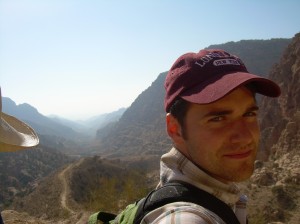 At breakfast overlooking Jordan’s gorgeous Wadi Dhana nature preserve, my companion Mary and I got to talking with an Australian family in the middle of a several months’ tour across the world. The father, an environmental scientist, asked if we had any books in English to swap. He just finished what he had been reading, Bernard Lewis’s What Went Wrong?—a history of the Middle East as a story of decline.
At breakfast overlooking Jordan’s gorgeous Wadi Dhana nature preserve, my companion Mary and I got to talking with an Australian family in the middle of a several months’ tour across the world. The father, an environmental scientist, asked if we had any books in English to swap. He just finished what he had been reading, Bernard Lewis’s What Went Wrong?—a history of the Middle East as a story of decline.
Mary and I have a knee-jerk reaction to Lewis, though of course (as with most knee-jerk reactions) neither of us has read much of him. We do know he has been a go-to scholar for American politicians looking to justify invasions in the Muslim world. He writes popular, historically-informed books readable by people who know little about the region. His scholarly credentials as a historian are top notch. But by what I could gather from our Australian friend, Lewis made for a depressing guide in Jordan. Through his eyes, one only sees what has gone wrong. As we sat in a darling hotel at one of Jordan’s new, ecologically-conscious nature reserves, our friends complained about the litter in the streets.
It is true, from what we’ve seen, the evidences of decline are plenty. Amman’s modernizing growth can’t help but stand starkly against all that has held the country and the region back: chronic unemployment, addiction to foreign aid, inadequate education, and poisonous infighting. Amidst all this, tourists wander through the crumbling wonders of Petra and among the pilgrimage sites of three great religions that these lands bequeathed to the world. But wadis that once bore running water have gone dry. The towering forests of the Bible are as absent as the Hanging Gardens of Babylon. Arab scientists go for their training to places that were obsessing over witch-hunts while their own ancestors were commenting on Aristotle.
 But there are signs of another kind too. Every guidebook raves about the celebrated Bedouin hospitality, which we have encountered again and again—the Plaza Hotel couldn’t hold a candle. Even a British administrator in the 1920s, who held to outdated theories of race, thought the Bedouin intellect as subtle as any he’d known at Oxford or Cambridge. Crime is far less common in Middle Eastern cities than in the U.S. Is this a sign of decline? And why are so many Arabs upset when their rulers act like vassals to Western states, or when their countries play host to foreign military bases?
But there are signs of another kind too. Every guidebook raves about the celebrated Bedouin hospitality, which we have encountered again and again—the Plaza Hotel couldn’t hold a candle. Even a British administrator in the 1920s, who held to outdated theories of race, thought the Bedouin intellect as subtle as any he’d known at Oxford or Cambridge. Crime is far less common in Middle Eastern cities than in the U.S. Is this a sign of decline? And why are so many Arabs upset when their rulers act like vassals to Western states, or when their countries play host to foreign military bases?
Through the lens of decline, these are either quaint oddities or symptoms of denial. But there are other lenses one can choose to wear than decline. That story is not so much an objective fact as a particular kind of story, and indeed one that has generated some devastating policies across the region in recent years.
When traveling through a place, there is a great temptation to think of it in terms one would never use for one’s home—a single, coherent, all-encompassing story. On the road, one needs such a thing, at the very least to keep track of the basic customs and sensibilities that one should beware not to offend. But stay a little longer, ask a few questions, and find that this country, too, has its contradictions, disputes, and competing storylines.
For instance, as I have gone from person to person trying to find “the Muslim view” on religion and science, I’ve found just so many answers. There are patterns, of course, but exceptions to every one.
What I much prefer is going along with Mary, who has less exalted credentials than Bernard Lewis, but speaks enough Arabic to impress people into talking with us—her reckless sympathy and darling smile help too. Together, we overturn stones. With every person we meet and sit with for tea, all our inevitable assumptions in mind, there come stories and stories within stories that lie beneath.